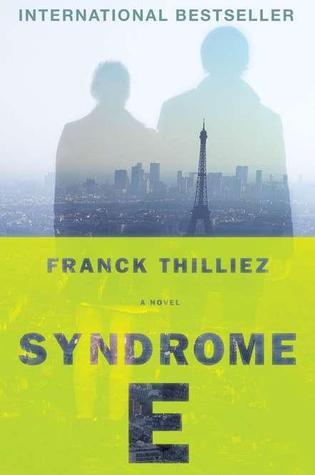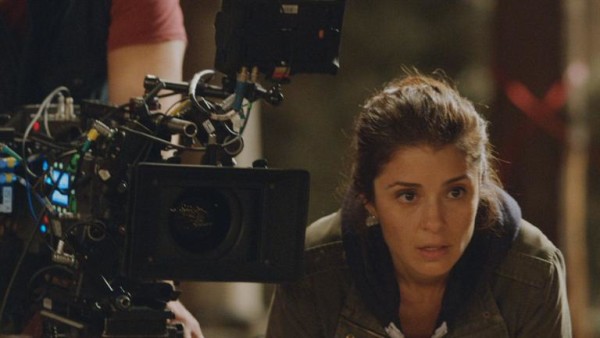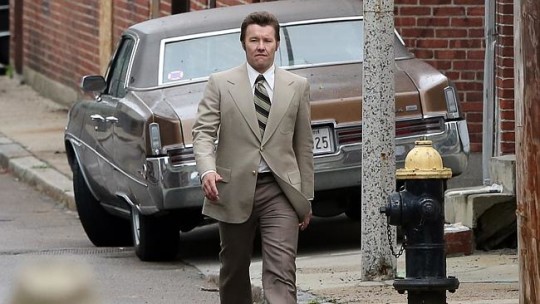Genre: Mystery-Thriller
Premise: When a group of boys turn up dead with their skulls surgically detached, a broken down FBI agent must use a mysterious 50 year old short movie to find their killer.
About: Mark Heyman wrote Black Swan for Darren Aronofsky and if I had to guess, the producers here hired him in hopes of tempting Aronofsky to direct this film as well. It’s very dark and “Aronofsky-esque” so we’ll see what happens. The book the script is based on was written by French writer Franck Thilliez. The 41 year-old author spent 10 years in a computer engineering job he hated before he began writing (those of you in a dead end job that you hate – let this inspire you!). Syndrome E placed in the middle of last year’s Black List.
Writer: Mark Heyman (based on the novel “Syndrome E” by Franck Thilliez)
Details: 123 pages – March 6th, 2014 draft
Syndrome E has all the makings of one of those bad books that could turn into a good movie. From everything I’ve heard, the book is a mess, but it does have a lot of cool ideas in it. We have weird 8mm films, kids with their heads sawed off, and a 50 year-old mutli-government worldwide conspiracy. If someone could wrangle the best parts of the book into a cool serial killer script, you might have yourself something.
And I could see Aronofsky coming on-board, lending his one-of-a-kind voice and turning this into a sprawling cornucopia of visual mastery. However, if he doesn’t, I could just as easily see this going to some scrub who turns it into a straight-to-digital Girl With The Dragon Tattoo rip-off starring John Cusack.
Isn’t it funny how that works? That two people could take the exact same script and create two totally different experiences? But Syndrome E is that kind of script. The kind of thing that could turn into The Ring or Pulse depending on the talent involved.
Agent Frank Sharkovsky (Sharko) stumbles upon the kind of case every Federal agent dreads. Five dead kids dumped in a river. All boys. Each around 12 years old. To make matters worse, the top of their skulls have been sliced off and their brains removed.
Meanwhile, across town, local cop Lucy Brennan visits her fuck buddy, Dominick, only to learn he’s purchased an old 8mm film at a yard sale and after watching it has TURNED BLIND. Lucy watches the film herself and is shocked when it depicts boys having their eyes slit open and being placed in front of live bulls trained to maul them to death.
Lucy and Frank eventually find each other when their cases overlap, and start chasing leads all over the world. Sharko finds out that a similar case of boys with their scalps sliced off occurred in Egypt. The resistance he gets there tells him that they’re definitely on the right track.
Their clues eventually lead them to an orphanage in Canada of all places, where they suspect the movie was made. It’s through this revelation that they realize what someone’s been doing to these poor children – inducing something called “Syndrome E.” But what’s happening to these kids pales in comparison to how long it’s been going on…… and what it’s being used for.
I like mystery scripts.
They’re perfect for spec writing (even though this isn’t a spec) because what’s one of the easiest tools you can use to keep a reader around? Mystery, right? Or, as JJ Abrams calls them, “mystery boxes.” The very nature of this genre is to provide the reader with a constant flow of mystery boxes that he’ll want to stick around to open.
The question is, does Syndrome E provide too many mystery boxes? Are there so many mysteries that we forget or stop caring about what the ultimate mystery is?
I’d say… no. And credit goes to Heyman here. He kept something together that could’ve easily fallen apart in a lesser writer’s hands.
The structure for the first act shows why Heyman is one of the big screenwriting guns in town. Instead of setting up a traditional problem with a single protagonist, Heyman sets up two problems with two protagonists. The first is Sharko, who’s been assigned to this case of murdered boys. And the second is Lucy, whose boyfriend’s just found a reel of film that’s turned him blind.
As we follow these parallel storylines, they eventually collide at the end of Act 1, allowing the characters to head into Act 2 as a pair. This seems simple from afar but whenever you’re messing with time-tested storytelling structure, you risk losing your audience. Remember, the audience has been conditioned with a certain level of expectation. Break that expectation and they can be confused. Or worse, angry.
It’s like throwing a birthday party and instead of serving cake, you serve pie. That pie might be great. But if everyone was expecting cake, there’s going to be some disappointment.
However, once the two detectives start working together, the script eases into more traditional territory. We have a clear goal ahead of us: Find the killer. And even though we have two protagonists, their objectives are the same, so the story’s never at risk of losing focus.
Syndrome E also thrives on something I call the TURBO MYSTERY BOX. Standard mystery boxes have an excitement ceiling (and are so 2011). So why not create a bigger badder version of the mystery box? For example, at one point, our detectives get a lead. Is this lead downtown at a local church? Nope, that’s so “standard mystery box.” Instead, it’s in EGYPT! That’s the kind of weird but flashy mystery box that can amp up a story.
Despite Heyman’s best efforts, Syndrome E suffered from its own version of Syndrome E. And that was its dated subject matter. We’ve seen the whole “people strapped to chairs with their eyelids pulled open, forced to watch a film” thing before. And the reveal of why these kids were being used as test subjects was pretty heavily telegraphed, robbing the script of a shocking finale. I wish the mythology behind the whole conspiracy was more original.
But you can’t deny that the screenplay is a page-turner. The Mystery Box formula is used so effectively here that there’s always a plot point to look forward to. The story’s a little confused at times (Is this a horror mystery or a thriller mystery?) but if you liked The Ring or The Girl With The Dragon Tattoo, there’s a good chance you’ll like this too.
[ ] what the hell did I just read?
[ ] wasn’t for me
[x] worth the read
[ ] impressive
[ ] genius
What I learned: If you’re going to use an analogy in your description, make sure it’s there to convey information, not to show off. I see this with a lot of new writers, who try to impress the reader at every turn. They write analogies describing pointless things, like how the sun is setting. Just like anything in writing, the analogies you use should serve a purpose – to further the reader’s understanding of the moment. So in Syndrome E, when Sharko is in Egypt, he realizes his handler is part of the conspiracy. So he has to find a way to ditch her. This is what Heyman writes:
He starts going before she can protest. She watches him, anxious. Like an owner whose dog has slipped its leash.
You see how the analogy provides a detailed visual of how the handler reacts when Sharko gets away? The analogy visually conveys the level of desperation in her eyes. Compare that to a writer who uses an analogy for no other reason than to write an analogy.
The sun rises up from the horizon, like a wild horse who’s just woken up from a long slumber.
How does that sentence improve the reading experience?
Genre: TV Pilot – 1 hr. Drama/Comedy
Premise: A look at the behind-the-scenes drama that occurs on a “Bachelor” like reality show.
About: Had you told me a month ago I’d be reviewing a Lifetime teleplay about reality television, I would’ve told you to bring me your torch. You’ve been voted off the island. But Lifetime is really high on this show and is giving it the full rollout treatment in anticipation of its June 1st premiere. Also, half-a-dozen people have e-mailed me on separate occasions to tell me how much they liked the script. And that doesn’t happen at all with TV pilots. The show was created by Marti Noxon, who adapted the YA novel, “I Am Number Four,” as well as the updated “Fright Night.” Marti’s also written a ton of TV, with her resume including Mad Men, Grey’s Anatomy, Buffy the Vampire Slayer, and Glee. Co-creator Sarah Shapiro, is making her writing debut here.
Writer: Marti Noxon & Sarah Gertrude Shapiro
Details: 55 pages – 8/28/13 draft
I’m guessing the percentage of the Scriptshadow reader base that also watches reality television is equivalent to the percentage of Mormons who caught 50 Shades of Grey. You’re not alone. The industry has never liked reality television.
It’s the reason why nobody would even glance at a screenplay that dealt with reality shows. The unofficial official company line was: Never write a screenplay about reality TV.
But that’s the funky thing about Hollywood. Is that something’s a given until all of a sudden it isn’t. And the “isn’t” is, in most cases, a good script. If you write a good script, your friendly neighborhood rule book can be tossed out the window.
So I have an extra modicum of respect for anyone who breaks through the firmly locked gates of Hollywood’s ivory tower with something different. Typically, when Hollywood wants to keep someone out, they succeed.
29 year-old Rachel is a reality show producer. Reality show producers are the behind-the-scenes workers who prime the contestants on your favorite reality show that you tell everyone you don’t watch to say what the show wants them to say. The ones who say they think they’re “falling in love” with Douglas the Bachelor even though they just met him 20 minutes ago? Yeah, Rachel’s the one who makes sure that soundbite happens.
A producer is SUPPOSED to stay objective and let the talent dictate the course of the story. But come on. If that were the case, you wouldn’t get those level 17 meltdowns from the former prom queen who’s just realized that no man will ever consider her marriage material. It’s Rachel who plants that seed a few days earlier so that when the contestant’s voted off, it all comes spilling out in her exit interview.
The thing is, Rachel hates her job. She considers it to be more soul-sucking than doing porn and if there’s anywhere else she could be, even if it was cleaning sewers in Mumbai, she would do it. That is, if she wasn’t so damn good at her job. Rachel can convince anyone to do anything, a highly valued skill in the world of producing reality television.
In this first episode, those skills will be put to the test when our “Bachelor,” Adam Conway of Conway Hotels, decides to quit just minutes before the show’s to begin. Rachel uses some Darth Vader level Jedi mind tricks on Adam to get him to reconsider. But they end up backfiring. Adam agrees to come back but only if he gets to have Rachel around all the time.
Of course, that leads to the most obvious of questions. If Adam and Rachel are going to be around each other so much, what’s going to happen between them? And if something’s going to happen between them, what does that mean for the 18 women vying for Adam’s hand in marriage?
As demand for product keeps expanding in television, more and more of these blacklisted ideas (“Never write about reality TV!”) are going to get lifted. TV is in this really rare place in history where the demand for product is way bigger than the supply.
So if you’ve tossed an idea out just because you’ve heard Hollywood hates it, it might be time to dust that idea off and write it. Today’s show proves it’s possible.
But it wasn’t just the idea that got the pilot on the air. This is good writing. In fact, Unreal utilizes one of the most powerful tools available to writers to make it work. IRONY.
The Bachelor is the personification of a fairy tale. Every date is postcard perfect. Every conversation is filled with laughter. Every kiss is framed against a golden sunset. So what is Unreal about? It’s about the cheating that goes on behind those dates. It’s about the manipulation used to guide those conversations. It’s about the bullying that must be used to get that golden kiss. Unreal is about the slimy underbelly of reality television, and that’s what makes it so fun.
“Irony” is a tough word for some screenwriters to grasp. So let’s put it this way. One of your biggest weapons as a writer is CONTRAST. Whatever extreme you have in one aspect of your idea, try to contrast it with the opposite extreme in another.
So if you have a show about happiness, contrast it with a crew who hates their jobs more than anything. If your main character is a serial killing cannibal, contrast that by making him polite and inviting. If you’re writing a scene about a woman dumping her boyfriend, create contrast by setting it at his birthday party. Contrast, my fellow screenwriting enthusiasts, is a really easy way to look like a really good writer.
Also, when you’re writing a romance-based show (or a show where people hook up a lot), you want to make it as hard for those people to hook up as possible. The more difficult it is for people to hook up, the more drama you’re going to get. So you have this show here where contestants hooking up with crew can destroy the entire production. So there are real stakes to people getting together who shouldn’t be together.
The only thing wrong with this pilot is that the execution’s vanilla. Everything kind of went the way you expected it to, save for a Rachel breakdown in the final act. You can even sniff out where the main hook-ups of the season are going to be. That can be enjoyable to an extent. Waiting for two people we’re dying to see get together finally get together. But there still needs to be an element of surprise to a show. And Unreal hasn’t shown me it’s capable of doing that yet.
I will say, though, that if you want a dark humorous look at the behind-the-scenes shenanigans of a reality television show, Unreal does a pretty good job of delivering.
[ ] what the hell did I just read?
[ ] wasn’t for me
[x] worth the read
[ ] impressive
[ ] genius
What I learned: Make it so your character must consistently go against their moral compass in order to push the story forward. Rachel hates manipulating these contestants. But she has to in order to get the big moment for the cameras. For example, when one of the girls is ready to give up, Rachel uses her knowledge of the girl’s previous boyfriend physically abusing her to promote Adam as the opposite of him. This dirty trick reenergizes the contestant and now she’s back pining for Adaman’s attention. Maybe a better way to convey this is this: Have your main character sell a little piece of their soul every time they have to do something important. This will ensure that your character is always fighting an inner battle, which audiences love to watch.
With indie sleeper “Ex Machina” kicking ass this weekend at the box office, I thought those who missed my script review might want to check it out. Enjoy! And now on to Black Mass…
Genre: Drama/Biopic
Premise: The real-life story of Whitey Bulger, a notorious Boston gangster who became an informant for the FBI to help take down the mafia.
About: If you’re a screenwriter and you haven’t explored writing a biopic, what’s wrong with you?? The genre is taking over the industry. And I think I know why. With the “star system” in Hollywood declining, biopics have become the one remaining area for movie stars to shine. Nobody goes to American Sniper if Ted Danson is playing Chris Kyle. Black Mass stars Johnny Depp and was to be directed by journeyman filmmaker Barry Levinson, but they decided to go with hot new shiny object Scott Cooper instead, who directed the gritty Christian Bale flick, “Out of the Furnace,” and the Jeff Bridges country music feast, “Crazy Heart.” Final screenplay credit was split between Mark Mallouk, who’s making his screenwriting debut here (he was previously a producer) and Jez Butterworth, who’s credited for such films as Edge of Tomorrow and Get on Up. Interestingly enough, this script notes that Johnny Depp has final say over the screenplay. I suppose this is more common than we know but it was a little surprising to see it in writing.
Writer: Mark Mallouk (this draft doesn’t yet include Butterworth) – based on the book “Black Mass: Whitey Bulger, The FBI and a Devil’s Deal” by Dick Lehr and Gerard O’Neil
Details: 115 pages – undated (looks to be a late 2012 draft)
After the recent trailer for Black Mass hit, I had to read the script. I love that they did something different with the trailer, focusing on a single scene instead of a bunch of them. And Johnny Depp. Whoa! The guy is practically unrecognizable as Whitey Bulger. And he’s acting again! I’m not sure you can say that about his previous five movies. Johnny Depp is the most kind, gentle, soft-spoken person in real life. But that man in the trailer? That was someone entirely different. That man was terrifying.
It’s 1974 and FBI Agent John Connolly has just moved back to Boston as the self-proclaimed “savior” of the city. The Irish and Italian gangs have turned the town into a hell-hole and he’s going to be the one to clean it up. His fellow Feds are skeptical, but Connolly’s got a secret weapon. He knows Whitey Bulger, the man running the Irish gangs.
Connolly’s idea is this. The FBI really wants the Mafia (the Italians). He recognizes that getting them out of the way is good for the Irish. So why not use the Irish’s knowledge about the Italians – the kind of information the Feds don’t have access to – to take them down? So Connolly goes to Bulger and asks him if he wants to be an informant.
It takes some convincing on both sides but soon everyone’s in, and thus begins a working relationship between Connolly and Bulger. Bulger feeds Connolly info and the FBI looks the other way when Bulger does unsavory deeds.
The problem is, Whitey Bulger works on his own time frame, not the FBI’s. He wants to know he can trust Connolly before he just starts throwing information at him. So there’s this constant tug-of-war between Connolly and his bosses regarding time. He needs more. They give him less.
Eventually the plan starts paying off, with Bulger giving the FBI the mafia’s hideout. But it’s a double-edged sword. With each new thing they learn about the mafia comes a new tidbit about Bulger himself, who they’re learning is a MUCH bigger criminal than anyone knew. And thus the question is asked. Are they getting rid of a demon only to replace him with the Devil?
Black Mass starts out with a great opening sequence. It’s 2011 and one of the FBI’s ten most wanted men, Whitey Bulger, has been spotted living in a small apartment in Santa Monica. The man who’s reported him to the Feds, the apartment manager, is tasked with tricking the notorious gangster to come outside his apartment so the FBI can scoop him up and arrest him.
Whitey is a man who used to have people like this manager sawed into pieces for even considering such a thing. But when the Feds tell you you have to do something, you do it. The scene is not only packed with suspense, but it brilliantly sets up our subject, conveying just how much of a badass Whitey Bulger is.
At the end of this scene, I scooched into my chair with a smile, ready for a long exciting adventure about the man who many feel was the most violent and dangerous in Boston’s history. You can color me disappointed, then, when that adventure never came.
Black Mass makes a shocking choice early on that ends up neutralizing its biggest asset. Instead of telling us the story through the eyes of the legendary Bulger, Black Mass focuses on the vanilla Jack Connolly to tell its tale.
This may have worked had we seen enough of Bulger’s antics to satisfy our morbid curiosity. But the script adds this storyline by which Connolly thinks Bulger is a harmless second-rate criminal. That’s how he was able to sell to the Feds going after the Mafia and not Bulger himself.
For that to work though, Connolly (and by association, us) can’t see Bulger do anything bad. As you’d suspect, this has a catastrophic effect on the level of drama in the film. Since Bulger can’t do anything bad, Bulger can’t do… well, anything at all! All of Bulger’s scenes are relegated to him nodding and doing whatever Connolly asks of him. I hate to put it this way, but 80% of this movie is Whitey Bulger being the FBI’s bitch.
I was shocked. Where was this terrifying legendary criminal I’d heard about? He wasn’t in this film. Which means Black Mass runs the risk of being the single biggest example of false advertising in biopic history. It would be like making a movie about Michael Jordan and never showing him play basketball.
As for that great scene in the trailer – it’s in this draft. But it’s an outlier. We don’t get any other scenes like it (save for 1-2 generic kill scenes) to show how terrifying Bulger is.
The plotting had issues as well. There’s a distinct lack of BUILD as the story goes on, and I think that’s because the script failed to establish the stakes of getting rid of the Mafia. I barely knew anyone in the Mafia here and it was never conveyed to me why getting rid of them was so important.
Lots of writers mistakenly believe that just saying so is enough. So if a character says, “Man, that Mafia is bad. They killed that woman last week,” then we’ll want the Mafia taken down. But that’s not how movies work. Movies work by SHOWING. Not TELLING. If you show the Mafia rip an innocent man to shreds because he looked at them the wrong way, NOW we’ll understand why the FBI needs to stop them. We’ve seen how dangerous they are with our own eyes.
But that’s a small part of a much bigger problem. Nobody really does anything bad in this movie. Not Whitey. Not the Mafia. It’s the PG version of the Boston crime story. Sure we hear about some bad things, but I don’t go to a movie to hear about something. I go to SEE it.
Of course, the nature of development is that you keep working on a script until it’s the best that it can be. And they did bring on another writer to do some drafts after this one. But something tells me the current approach of this script is unfixable. You can’t neuter and borify the most ruthless killer in Boston history. You have to let a character like that loose.
I went into this script thinking Whitey Bulger was a major badass. I left thinking he was just a regular guy who occasionally committed crimes.
[ ] what the hell did I just read?
[x] wasn’t for me
[ ] worth the read
[ ] impressive
[ ] genius
What I learned: Use visual cues to convey time passing. There was a moment in Black Mass where the FBI director tells Connolly, “It’s been six months and Bulger hasn’t given us anything!” So poorly was the passage of time conveyed, that had that same character said it had been “2 weeks,” I wouldn’t have batted an eye. Improperly conveying time can make a script feel drifty and sloppy. So use visual cues to help the reader along. For example, you might make a key female character pregnant. A tiny bump one scene and a big bump another scene instantly conveys 6-7 months have passed. A family gets a puppy. A few scenes down the line, that dog is now full grown. Highlight seasons changing. It’s sunny and 85 out. Cut to next scene, it’s now snowing. These are the most obvious examples so I actually encourage you to be creative and come up with your own. But if we have no idea how much time is passing in your story, we can become confused. And confusion often leads to frustration.
What I learned Two: If you have a compelling character, you want to construct a storyline that allows that character to thrive. For example, if you’re writing a story about the greatest astronaut in history, you probably don’t want to set the entire movie down on earth.

While everyone clamors to perfect their Scriptshadow 250 entries, a bold group of screenwriting gummy bears choose to place their letter spaghetti in front of the interconnected computer sphere in hopes of rainbow transformation. May we wish them a transition to a higher state of being.
Title: To Boldly Go
Genre: Biopic
Logline: In 1964, writer Gene Roddenberry struggles to get his vision on television – a show called “Star Trek”.
Why you should read: Three reasons. One – unlike other biopics which give you the whole Wikipedia routine, my script focuses on a year-long period in a man’s life, during which he has a clear goal. Two, it could generate a discussion on the act of using licensed properties you do not own in a spec written as a sample. (Like “Wonka”, which I am certain will not be made unless Roald Dahl’s zombie corpse approaches a production office, gobstopper in hand, and signs off on it while offering casting notes: “Two words: Get Gosling.”). And, three, my script comes from the heart. My father passed on in ’91, when I was kid, and one of the things he instilled in me was a love of science fiction, particularly “Star Trek”.
Title: The Camelot Club
Genre: Comedy
Logline: A religious man and his sexually deviant cousin unexpectedly inherit a run down strip club and have two weeks to make fifty thousand dollars or be killed by a seven foot transsexual pimp.
Why You Should Read: What do you get when you add together a 6’3” ginger Pole and an average height, golden tan Croatian? The Camelot Club, a combination of tanned, god-like overconfidence and the inherit self-loathing that comes with being orange and pale. We came together to write this script so we could split the crushing despair that comes when someone inevitably tells you your scripts reads like German is your native tongue (an actual criticism I received on my very first script, which hurt even more considering the only language I know is English). In the end we are just a couple of struggling artists looking to be accepted into the soft, voluptuous bosom of the screenwriting community (an agent and management would be nice, too). After learning the English language more better, and getting the screenwriting turds out of our systems, we put our minds together and produced The Camelot Club. And now I would like to end on a testimonial from my bi-polar, alcoholic brother, “…this script was so good it made me wish I was tri-polar…”. Enjoy!
Title: The Stone Addendum
Genre: Action
Logline: An Israeli secret agent has less than two days to prevent a terrorist hostage exchange in the U.S., but he must rely on help from an innocent Muslim woman that he’s ordered to kill once the mission is complete.
Why you should read: This script appeared in AOW a ways back to pleasant but uneventful reviews. Since then, with the help of Carson’s notes, it’s gone through a major makeover, and registered a Page Quarterfinals, a BlueCat Top 5%, and most recently a Top 25 in the Tracking Board. The latter billed it as TAKEN meets THE HURT LOCKER, and “the perfect blend of brains and brawn.” I think I’m in the red zone on this one, but can’t seem to punch it into the end zone with producers. Feedback from the SS community would be more than helpful. Thanks in advance to anyone taking a look.
Title: Tammy
Genre: Comedy
Logline: A young man from a strict religious family awakens from a severe head injury with the personality of a vulgar, slutty party girl named Tammy.
Why you should read: (from Tammy) heyyyy. so like, i didnt write this er whatever. the movie. but its awesome. mainly cuz its about me. myy names Tammy… & yes, im way hotter then that slam pig melissa mccarthy who took my name and shat on it. i like to party & get schwasty, unlike my dumpy foster mom. but seriously. u hafta read this. normaly, id suck u off, but i cant do that thru email… so quit beatin ur ham & open this script. u wont be sorry & if u r… gimme ur address & ill make it up to u. im like UPS… i deliver my box to strangers ;)
Title: Tampa Bay
Genre: Buddy Action
Logline: An old, homophobic, U.S. Marshal must seek the assistance of a gay FBI agent to solve the murder of a neighbor’s daughter.
Why You Should Read: I think it’s about time we had an action hero who just happens to be gay. He should be a badass first, and gay second. So that’s exactly what I wrote.
Get Your Script Reviewed On Scriptshadow!: To submit your script for an Amateur Review, send in a PDF of your script, along with the title, genre, logline, and finally, something interesting about yourself and/or your script that you’d like us to post along with the script if reviewed. Use my submission address please: Carsonreeves3@gmail.com. Remember that your script will be posted. If you’re nervous about the effects of a bad review, feel free to use an alias name and/or title. It’s a good idea to resubmit every couple of weeks so your submission stays near the top.
Genre: Crime-Thriller
Premise (from writer): After two teens are murdered, a Detroit police lieutenant is hard-pressed to end an unprecedented wave of retributive violence—not against the gang suspected of killing them, but against the gang members’ families and loved ones.
Why You Should Read (from writer): I’ve written a number of scripts, and up to this point they’ve all been fairly comfortable, meaning they were in genres I felt I could do well. Mostly light comedies and family-oriented scripts. But I had an idea for something quite a bit darker and edgier rolling around in my brain for some time now. “Retribution” is the result. — It’s probably the most complex, layered story I’ve written. The challenge for me was to make it a clear and straight-ahead story despite the complicated storyline. I’d love to hear from the Scriptshadow community whether or not they think I’ve succeeded.
Writer: Somersby
Details: 112 pages
I believe all screenwriters should try and perfect a genre. And preferably, it would be the genre they love. Get in there, watch every movie ever made in that genre. Then write 5-10 screenplays in it. Just immerse yourself in all its unique traits. Because different genres have different requirements. For a good Thriller, you have to be a master of twists and turns. For a good Comedy, you have to be a master of witty dialogue.
However, it’s also important to push yourself every once in awhile. And that means getting out of your comfort zone – writing something in unfamiliar territory. These exercises can be unexpectedly exciting because there’s a new challenge around every corner. I’m not sure they ever end up being your best work. But they definitely help you grow and expand as a writer. Let’s see how Somersby did with this approach.
After watching a basketball game downtown, suburban brothers Noah and Wyatt hop in their car to head home. Wyatt, 15, insists on driving in anticipation of getting his license, but quickly gets lost in a bad neighborhood. When he goes to ask directions at a convenience store, he stumbles upon a few gangbangers robbing the place and gets shot dead. Noah makes a run for it but the thugs catch up to and kill him as well.
Hard-nosed veteran Lieutenant Jacob Brant and ladies man investigator Franco Marietti are assigned to the case, and immediately zoom in on a local gang known as the V-Boyz. But that’s no consolation to Tecca Bellwood, the boys’ mother. She and her husband, Marc, know that finding the killers isn’t going to bring their kids back.
Still, Brant and Marietti have to do their job, and start looking into the V-Boyz. That is, until, family members linked to the gang start getting shot by a mysterious killer. First it’s a V-Boyz wife, then a grandmother, then a girlfriend. Brant and Marietti figure it’s got to be someone who wants the V-Boyz to suffer, and Marc (the dead boys’ father) seems like the most likely culprit.
But as they continue to dig, the truth about the convenience store robbery surfaces, throwing everything into question. Who really killed those boys that day? And how is this mysterious killer connected to them?
Yay! We get a script by longtime commenter, Somersby. Not surprised at all that his script dominated last week’s Amateur Offerings. Someone with this much screenwriting knowledge wasn’t going to deliver something subpar.
I definitely liked parts of Retribution. In fact, I thought the last 30 pages were great! That’s when the script really came together.
But I can’t say the same about the first 80 pages. There was nothing wrong with them. In fact, they were very well-written. But something about them didn’t GRAB ME AND PULL ME IN. I was never that invested in the story. And I identified a few reasons why.
For starters, I don’t think this script had a main character. Not that every script needs a main character but if you DON’T have a main character, you risk alienating your reader. Readers want to latch onto someone. Relate to them. Empathize with them. In a way, a main character becomes the reader’s avatar in the story.
Without that one-on-one connection, getting a reader to emotionally invest in your story is a lot tougher. And that’s what happened with me. I was never emotionally invested because I didn’t have anybody to emotionally invest IN.
Also, up until page 90, the execution of the script, while technically perfect, was creatively basic. It was all very predictable and “been-there-done-that.” When you added that on top of having no one to connect to, it made for some average reading.
Finally, there was the serial killer element. This added the dimension, I’m guessing, that Somersby felt would make the script different from others in the genre. Which is good. That’s exactly what you want to do.
The problem, though, was that the people who were being killed were “bad” people. They were family members of gangbangers. So I didn’t care if they were killed. I was like, “Good, keep killing. These gang members deserve to suffer.”
That storyline was meant to create suspense. But since I didn’t care that these people were being killed and therefore didn’t care who was doing it, I had no real desire to learn the truth.
Despite all that, I give Somersby credit for the killer reveal. I wasn’t expecting that at all (spoiler: For those not reading the script, the killer ends up being the mom). And once the killer is revealed, the mad dash to stop her gives that last 20 pages all the energy the first 90 pages were missing. In fact, because the last 20 pages were the script’s best, we end up somewhat happy with the result.
But if I were Somersby, I’d ask myself if there’s a way to tell this story with a main character. I’d actually consider telling it from Tecca’s (the mom’s) point of view. That (spoiler) would make the reveal even more shocking. Although how you’d hide her involvement in the murders while following her as the main character, I don’t know. It’s possible though. Isn’t that what #1 Black List script (spoiler for the 2013 #1 Black List script) Holland, Michigan did?
Even if you were to solve that problem, you still run into the issue of: Is this concept big enough to power a movie? As I was reading this, I kept waiting for some hook to arrive that gave “Retribution” that “larger than life” quality I say I’m always looking for in a spec. Right now it’s a pretty standard crime-procedural. I think Somersby’s capable of more.
But it was still fun to read a script from Somersby. The script definitely had its moments. If the first ¾ was as good as the last ¼ this would’ve had my vote. As it stands, it didn’t quite get there. How about you guys? What did you think?
Screenplay link: Retribution
[ ] what the hell did I just read?
[x] wasn’t for me
[ ] worth the read
[ ] impressive
[ ] genius
What I learned: It used to be that studios would release 10-15 cop/crime films a year. They don’t do that anymore. And the ones that do get made get limited releases or go straight to digital. So I’d say, if you’re going to write a crime/cops/procedural script, find a flashy hook for it. Give us that larger-than-life high concept angle to really elevate it enough that studios would want to put it on their slate. The two biggest spec crime films of last year focused on the best CIA killer in history (The Equalizer) and the best hitman in history (John Wick). Their main characters were almost superheroes. Not to say we should’ve done the same here. But that’s what you’re going up against these days. You’re going up against these big-idea big-character crime films.








